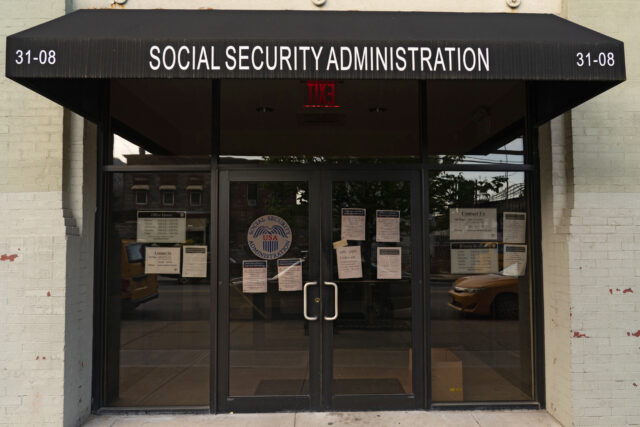Filter


Arrival of First Long-term Mortgages Helped Fuel Baby Boom
Among the many explanations for the baby boom are rising incomes in the post-war economy, modern appliances that made childrearing more manageable, and lots of women who were no longer working in the factories. But a new study makes a compelling case for another cause: FHA and VA mortgages that made borrowing money for a house much more affordable for young couples. These mortgages changed homeownership from a privilege to a viable option for working-class and middle-class couples who wanted to raise a family. Federally insured FHA and VHA loans reduced the upfront cost of buying a house. The mortgage programs drove the births of an additional 3 million babies between 1935 and 1957, researchers from the Federal Reserve Board…
March 13, 2025
CFPB’s Main Job: Protecting Your Hard-earned Money
With its fate hanging in the balance, it’s a good time to remember the Consumer Financial Protection Bureau arose out of subprime mortgage scams like these. A mother who moved her young children out of coveted government-subsidized housing after a loan broker told her she could afford a house. Foreclosure ensued immediately. A woman wanted to buy a house but she had poor credit. The broker addressed that by adding her unemployed daughter to the application and falsely claiming the pair owned a hair salon. The broker filled out a business license at city hall on their behalf. A young couple from Colombia were thrilled to be able to buy a home. They were unaware the broker had inflated t…
March 6, 2025
COVID and Tech Fueled Fraud Against Older Americans
COVID and technological advances have created a perfect storm of fraud against older Americans. Between 2019 and 2023, the number of fraud cases reported to the Federal Trade Commission more than doubled to 2.6 million. But the losses from these scams tripled to $10 billion, indicating the scammers are becoming more effective. “Today’s scams are more coordinated, more sophisticated and more personalized,” Ray Bellucci, executive vice president of TIAA said in a new report on fraud focused on the impact on Americans over 60. Older people have long been more susceptible to fraud due to high rates of social isolation, heightened during COVID. This is especially true if they are divorced, single, or widowed and don’t have someone to talk…
February 27, 2025
“Renewment” Rather than Retirement
In a recent podcast, syndicated columnist Helen Dennis and I discuss her program for “renewment” as opposed to retirement. Specifically aimed at career women in or moving towards retirement, Dennis and her program co-founder Bernice Bratter have convened more than 40 groups of women working together to find fulfillment in their post-working lives. These groups of eight to ten women meet regularly, sometimes for decades, to discuss the issues they face in their later years. While each group is autonomous, they are guided by Dennis and Bratter’s book, “Project Renewment: The First Retirement Model for Career Women.” It provides prompts for discussion such as: The New Retirement Dennis explained to me that a lot about retirement has changed in recent decades. This is t…
February 20, 2025
Workers on Federal Disability Often Exceed Earnings Cap
To qualify for federal disability benefits, individuals must demonstrate that a medical condition prevents them from working. But some disability beneficiaries do work and those who earn more than Social Security allows are not entitled to a monthly benefit. These working beneficiaries may run the risk, often unwittingly, of being overpaid. The overpayments must be paid back, which can cause hardship for a group of individuals who are already struggling financially. According to researchers at Mathematica, the risk is high that working beneficiaries receive payments they aren’t entitled to. While only 4 percent of the people in this study have earnings above the monthly limit, the Social Security Administration overpaid 82 percent of them during the decade the researchers…
February 13, 2025
During COVID, Applicants Adjusted to Social Security Office Closings
When COVID swept in, the U.S. Social Security Administration responded quickly and closed its field offices on March 27, 2020. They remained closed for two full years, largely eliminating the option to apply in-person for federal disability benefits. So what did people who needed to apply do instead, and how did the closings affect the flow of applications? Were some people with disabilities deterred from applying at all? New research answers these questions by analyzing Social Security’s data for online, telephone and in-person applications to assess the impact of this unprecedented disruption in the agency’s in-person services. The researchers estimate that the suspension of in-person applications caused a 6 percent decline in all disability applications submitted to the agency over…
February 6, 2025
Paid Sick Leave Helps Older Workers, Who Need it Most
It’s common for older workers to develop an acute medical problem requiring immediate attention or to have a spouse or parent who suddenly becomes ill and must be cared for. Paid sick leave provides the flexibility for short periods to cope with the medical and caregiving demands that crop up more frequently as people age. A new study confirms these policies are very effective in helping older workers in particular maintain their level of employment while they get through a crisis. Providing paid sick leave is a fairly common practice in this country. A majority of workers already have access through their employee benefits. Over the past decade, a growing number of state and local governments have also mandated paid…
January 30, 2025
Caregivers Need Help and Know What They Want
Some 38 million family caregivers spend an estimated 36 billion hours a year caring for their loved ones. The patchwork of federal and state assistance available to them doesn’t match up to the weight of this burden. One policy in particular stands out as something they feel would help them: direct payments for their time spent as a caregiver. While this benefit exists under numerous state Medicaid programs, these programs help limited numbers of people because the eligibility requirements are very difficult to meet. Yet direct payments were by far the most popular policy option: 44 percent of the caregivers who participated in recent focus groups said this was their top choice among various options for financial assistance. Direct payments…
January 23, 2025
How COVID Inflation Spike Hit the Disability Community
People with disabilities make all kinds of purchases most workers never need. They might have to buy a wheelchair, build an access ramp, or take cabs because they can’t drive. People with hearing, vision or speech disabilities use electronic or computerized assistive devices and software. Some need home health aides, and many spend more on medical care. To fully understand their specific needs, researchers at Stony Brook University and RAND developed a detailed survey of nearly 2,000 people with disabilities, using input from experts with disabilities themselves or experience in the field. The authors conducted an analysis of the survey data on people who are receiving benefits from Social Security’s disability program or its companion program, Supplemental Security Income. Their survey reveals…
January 16, 2025
A Model for Elder Care? Supported Housing Offers Some Hope for the Future
Much of what I’ve been writing about lately are the dire prospects for elder care when the oldest baby boomers begin reaching their late 80s within a decade. The challenges we will face are exacerbated by the physical design of our communities based on single-family homes scattered around the suburbs. This leads to the isolation of seniors, especially when driving becomes difficult and older adults can become confined to their homes. It can also make it expensive to provide services in their homes as home care workers, visiting nurses, and other providers must travel relatively long distances to serve their clients. Fortunately, there’s an alternative. In my latest Risking Old Age in America podcast, Lizbeth Heyer, President of 2Life Communities in greater Boston, describes…
January 14, 2025
State Auto-IRA Savings Could Affect Medicaid Eligibility
Low-income retired couples with less than $3,000 in assets can get Medicaid to supplement their Medicare insurance or pay for a nursing home. This asset cap, set by state governments, mainly applies to financial accounts and excludes the value of a home and vehicle. But Medicaid coverage in old age could conflict with auto-IRA initiatives in a growing number of states – 16 so far – that are designed to help workers without an employer 401(k) save for retirement. The substantial savings workers will build up in these auto-IRAs could make some ineligible for the extra health insurance coverage once they retire, even if their income meets the program’s income cap, according to a new study by the Center for…
January 9, 2025
Racial Inequities Carry Over from Work to Retirement
The Social Security Administration encourages applicants for its research grants to explore “the structural barriers that may contribute to disparate outcomes among people who have been historically underserved, marginalized, or adversely affected by persistent poverty.” Numerous studies resulting from this research agenda reveal deep differences in how older Black and White Americans experience work and retirement. The studies have been conducted by researchers around the country, and many have been covered in this blog over the past year, which is also supported through a grant from Social Security. Consider some studies that have relevance for a central argument made by financial advisers – that the best route to security in retirement is for older workers to delay signing up for…















